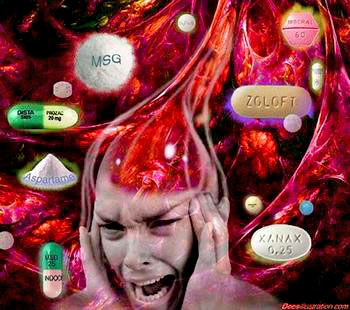|

by Marco Torres
April 30, 2012
from
PreventDisease Website

It's a sign of the times where the
medicalization of almost every human behavior is being documented,
labeled and categorized as some type of illness or 'disorder.'
A psychiatrist who heads the National
Institute of Mental Health (NIMH) wants to broaden the
definition of children with mental illness so that unruly and badly
behaved kids will soon be diagnosed as having mental disorders.
It's not terribly shocking anymore to have some so-called expert,
academic or psychiatrist label perfectly normal human behaviors as
disorders.
What a coincidence that this one happens
to head the NIMH.
"One reason we haven't made greater
progress helping people recover from mental disorders is that we
get on the scene too late," said Thomas R. Insel, MD, director
of the NIMH and the featured speaker at the American Academy of
Pediatrics' Presidential Plenary during the Pediatric Academic
Societies (PAS) annual meeting in Boston.
What Dr. Insel is referring to is
that more children are not being diagnosed with mental disorders at
an earlier age, thus decreasing the demographic of available
candidates for psychiatric evaluation and pharmaceutical
intervention.
Dr. Insel discussed signs of mental
illnesses in young children and the importance of early diagnosis
and intervention in his presentation, "What Every Pediatrician Needs
to Know about Mental Disorders," on April 29, in the Hynes
Convention Center.
He insists that as the first line of defense, pediatricians should
detect mental disorders early and ensure children get drug treatment
as soon as possible. He foresees migrating from the current
screening tools involving questionnaires to other methods such as
cognitive and genetic testing.
Dr. Insel is very blunt about diagnosing a child's behavior problems
as a mental disorder.
It's important to understand that mental
illnesses are a developmental brain disorder even though they can
look like behavior problems, Dr. Insel explained.
"The future of mental illness has to
be at the point where we aren't treating behavior separately
from the rest of the person," he said. "There needs to be full
integration of behavior and medical concerns."
All children misbehave - it is their
nature.
The medicalization of normal these
normal behaviors further support ongoing research into the
disturbing and ongoing chemical abuse of children by conventional
medicine. The prescription of psychiatric drugs to the masses,
specifically children, are altering their minds, bodies and entire
lives.
See
Generation Rx.
Intermittent
Explosive Disorder - Oppositional Defiant Disorder - Mathematics
Disorder
If you've never talked to your doctor
about these conditions, it should come as little surprise; they are
arguably some of the stranger diagnoses floating around in the
medical literature.
And although ridiculous to any sane
person, many medical professionals say that these disorders are
legitimate conditions that often warrant treatment.
"Illness is always a social
construct," notes Dr. Nortin Hadler, professor of medicine and
microbiology/immunology at the University of North Carolina at
Chapel Hill, and author of the book "Worried Sick: A
Prescription for Health in an Overtreated America."
"People have to agree - both people, in general, and those in
the medical community - that a life experience should be labeled
an illness," Hadler says.
"For example, the Victorians
medicalized orgasm, and we medicalize the lack of it."
Dr. Igor Galynker, director of
The Family Center for Bipolar Disorder at Beth Israel Medical
Center in New York, says that some psychiatric conditions, in
particular, tend to be a target of widespread controversy.
"In psychiatry, part of a disorder
is clinically defined and part is societally defined," he says,
adding that conditions, such as
Attention Deficit Disorder, or
ADD, are particularly contentious.
"An ADD diagnosis is very controversial, especially after a
recent paper suggested some children with ADD 'grow out' of it
at age 25," he says.
"That would mean that ADD is a phase
in development, rather than a disease... It is all fluid."
Recent proposed changes to the
Diagnostic and Statistical Manual (DSM), the bible of the
psychiatric profession childhood temper tantrums, teenage
irritability and binge eating as psychiatric disorders.
The DSM is in its fifth edition. It has been criticized for
formalizing character traits and emotions into mental conditions and
for encouraging their medical treatment, often with drugs that have
powerful side effects.
In addition to serving as director of the NIMH, Dr. Insel is acting
director of the National Center for Advancing Translational
Sciences, a new arm of the National Institutes of Health that has
been specifically developed to accelerate diagnosis of mental
disorders and subsequent pharmaceutical drug treatment.
|

